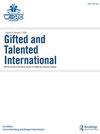Gifted Irish students’ perception of academic experiences during the pandemic
Q3 Social Sciences
引用次数: 0
Abstract
ABSTRACTCovid-19 had direct impact on education systems worldwide with school closures affecting learning for many students, including gifted adolescents. This study explored students’ perceptions of emergency online learning at school and how these differed to in-person classes and online classes they attended in the Centre for Talented Youth, Ireland (CTYI). Data analyses identified four factors of student responses (N = 322): Teacher Support, Self-Regulated Learning, Motivation Support, and Resource Access. Overall, CTYI received the highest mean scores across all categories and students favored in-person learning to online learning. Results highlighted a significant difference in scores between students in junior cycle of secondary school and senior cycle. Senior cycle students consistently reported less positive perceptions of their online learning than did junior cycle students. Using cluster analysis, patterns of online learning responses were identified. Despite differences in group comparisons, both senior and junior cycle students were found in clusters with positive attitudes and in clusters with negative attitudes. The findings have implications for future research, which should explore motivational and support changes that may be occurring in the transition from junior to senior cycle, as well as differences in self-regulation abilities.KEYWORDS: Academic experiencesadolescentsCOVID-19educationemergency online learninggiftedmotivationself-regulation Disclosure statementNo potential conflict of interest was reported by the author(s).Additional informationNotes on contributorsRebecca McDonnellRebecca McDonnell, MSc is a research assistant at the Cetre for Talented Youth Ireland.She has an MSc in Applied Developmental Psychology and is currently training to be a Doctor in Educational Psychology in University College Dublin. Her areas of interest include coping mechansisms in students and professional development of teachersJennifer Riedl CrossJennifer Riedl Cross, Ph.D. is Director of Research at the William & Mary Center for Gifted Education. She is the Editor of the National Association for Gifted Children’s research journal, the Gifted Child Quarterly. She co-edited, with Tracy L. Cross, of the Handbook for Counselors Serving Students with Gifts and Talents, now in its second edition. Her research in the field emphasizes social and psychological aspects of gifted educationColm O’ReillyColm O’Reilly, Ph.D is the Director of the Irish Centre for Talented Youth (CTYI) at Dublin City University. CTYI provides fast paced classes for academically talented students aged 6 – 16 years from all over Ireland and overseas. Colm has worked in the area of gifted and talented education for over 20 years and has written books and articles and presented papers at numerous conferences around Europe and worldwide. He has experience in teacher training for gifted students and is responsible for the implementation of many classes and initiatives for gifted children in Ireland.Tracy L. CrossTracy L. Cross, Ph.D., is the William & Mary Jody and Layton Smith Professor of Psychology and Gifted Education, and the executive director of the W&M Center for Gifted Education and the Institute for Research on the Suicide of Gifted Students. He has published more than 150 articles, book chapters, and columns; made hundreds of presentations at conferences; and published numerous books. He is past editor of numerous journals, including Gifted Child Quarterly, Roeper Review, and the Journal for the Education of the Gifted and he is the founder of SENG Journal: Exploring the Psychology of Giftedness.Leeanne HinchLeeanne Hinch, Ph.D is the Academic Coordinator for the Centre for Talented Youth (CTYI) at Dublin City University. Leeanne holds a PhD in Science Education from Dublin City University, specifically focusing on the preparation of pre-service science teachers. She has worked in the area of gifted and talented education for over 10 years and has published articles and presented papers at conferences around the world. Her research interests include gifted and talented children, gifted disadvantaged students, inquiry based science education, effective practices for teaching science to gifted students, and professional development for teachers.Anyesha MishraAnyesha Mishra, is a doctoral student in the Gifted Education Administration program of the Educational Policy, Planning, and Leadership department at William & Mary School of Education. With a background in psychology, Anyesha has a special interest in understanding the psychological and social factors influencing the development of students with gifts and talents. Her other areas of interest include programs and institutional collaboration in nurturing and motivating such students, and evaluation of programs for the gifted. She is presently the administrative editorial assistant for Gifted Child Quarterly.大流行期间爱尔兰天才学生对学术经历的看法
摘要2019冠状病毒病对全球教育系统产生了直接影响,学校关闭影响了包括资优青少年在内的许多学生的学习。本研究探讨了学生对学校紧急在线学习的看法,以及这些看法与他们在爱尔兰才华青年中心(CTYI)参加的面对面课程和在线课程有何不同。数据分析确定了学生反应的四个因素(N = 322):教师支持、自主学习、动机支持和资源获取。总体而言,CTYI在所有类别中获得了最高的平均分数,学生们更喜欢面对面学习而不是在线学习。结果显示,初中阶段和高中阶段的学生在成绩上存在显著差异。与初中生相比,高年级学生对在线学习的积极看法一直较低。通过聚类分析,确定了在线学习反应的模式。尽管组间比较存在差异,高年级和初中生都出现在积极态度组和消极态度组中。这些发现对未来的研究具有启示意义,未来的研究应该探索从初级到高级周期过渡中可能发生的动机和支持变化,以及自我调节能力的差异。关键词:学术经历;青少年;教育紧急情况;在线学习;;其他信息关于撰稿人的说明丽贝卡·麦克唐纳丽贝卡·麦克唐纳,硕士是爱尔兰青年人才中心的研究助理。她拥有应用发展心理学硕士学位,目前正在都柏林大学学院接受教育心理学博士培训。她感兴趣的领域包括学生的应对机制和教师的专业发展詹妮弗·里德尔·克罗斯博士是威廉玛丽资优教育中心的研究主任。她是全国天才儿童协会研究期刊《天才儿童季刊》的编辑。她与特雷西·l·克罗斯(Tracy L. Cross)合编了《为有天赋和才能的学生服务的辅导员手册》,现在是第二版。她在这一领域的研究重点是天才教育的社会和心理方面科尔姆·奥莱利博士是都柏林城市大学爱尔兰天才青年中心(CTYI)的主任。CTYI为来自爱尔兰和海外的6 - 16岁的有学术天赋的学生提供快节奏的课程。科尔姆在资优教育领域工作了20多年,撰写了书籍和文章,并在欧洲和世界各地的许多会议上发表了论文。他在天才学生的教师培训方面有丰富的经验,并负责在爱尔兰实施许多针对天才儿童的课程和倡议。特蕾西·l·克罗斯博士是威廉和玛丽·乔迪和莱顿·史密斯学院的心理学和天才教育教授,也是W&M大学天才教育中心和天才学生自杀研究所的执行主任。他发表了150多篇文章、书籍章节和专栏;在会议上做了数百次演讲;并出版了大量书籍。他曾担任众多期刊的编辑,包括《天才儿童季刊》、《罗珀评论》和《天才教育杂志》,他是《SENG杂志:探索天才心理学》的创始人。Leeanne Hinch博士是都柏林城市大学青年才艺中心(CTYI)的学术协调员。Leeanne拥有都柏林城市大学科学教育博士学位,专注于职前科学教师的培养。她在资优教育领域工作了10多年,并在世界各地的会议上发表了文章和论文。她的研究兴趣包括资优儿童、资优弱势学生、探究式科学教育、资优学生科学教学的有效实践以及教师的专业发展。Anyesha Mishra,是威廉玛丽教育学院教育政策、规划和领导系资优教育管理项目的博士生。作为一名心理学专业的学生,她对了解影响天才学生发展的心理和社会因素有着特殊的兴趣。她感兴趣的其他领域包括培养和激励这些学生的项目和机构合作,以及对资优项目的评估。她目前是《天才儿童季刊》的行政编辑助理。
本文章由计算机程序翻译,如有差异,请以英文原文为准。
求助全文
约1分钟内获得全文
求助全文

 求助内容:
求助内容: 应助结果提醒方式:
应助结果提醒方式:


